Disclaimer: This blog post contains affiliate links. If you make a purchase through these links, I may earn a small commission at no additional cost to you. Learn More. Thank you for supporting our garden community.
The Best Fertilizer for Pepper Plants to Grow Delicious Fruits
If you’re looking to grow healthy, thriving pepper plants, understanding the role of fertilizer is crucial. The right fertilizer not only boosts the growth of your peppers but also helps in achieving a bountiful harvest. In this post, we’ll dive into everything you need to know about fertilizer for pepper plants — from choosing the right type to proper application and timing.
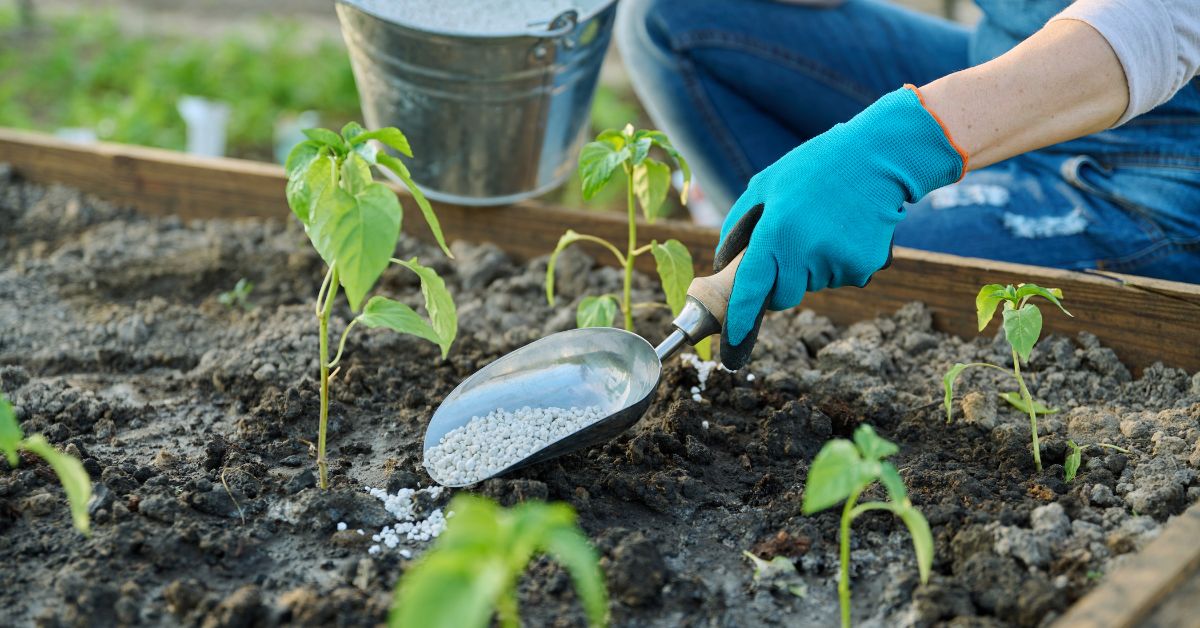
Best Fertilizer for Pepper Plants
If you have a short growing season like me, then it can be difficult to get a good pepper harvest. They grow for a long time and need a lot of nutrients to support it.
This is where fertilizer comes in.
Peppers can theoretically get all of the nutrients they need from the soil, but why not increase their growth rates by fertilizing them?
This will give you larger plants, more peppers, and a longer harvest window.
That being said, let’s get right into the best fertilizer for pepper plants
Products:
To buy high-quality garden seeds, check out Burpee.
For a wide selection of perennial garden plants, check out Nature Hills Nursery.
For gardening equipment, check out Bootstrap Farmer.
Why Fertilize Pepper Plants?
Pepper plants are heavy feeders, meaning they use up a lot of nutrients to grow properly.
The leaves, roots, flowers, and fruits require lots of macro and micronutrients to grow the way they grow.
This is unlike something like radishes, which are considered light feeders. This means they don’t need a lot of nutrients to grow properly.
So make sure to provide your pepper plants with a lot of nutrients to fuel their growth.
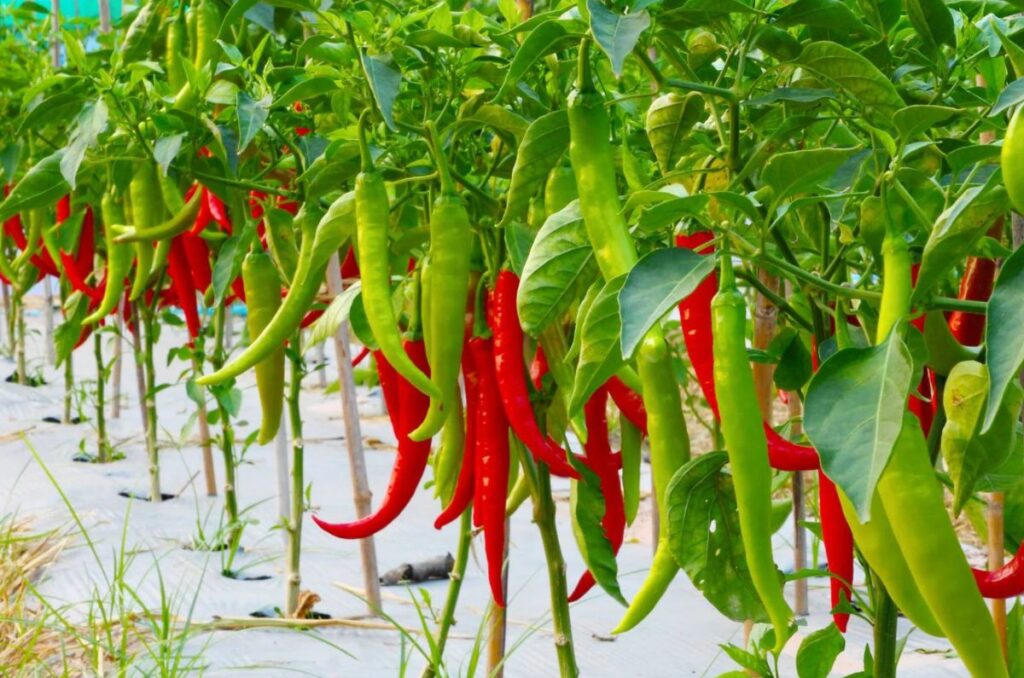
Which Nutrients do Peppers Need?
Peppers need a variety of nutrients, which each fall into one of two categories. They are either macronutrients or micronutrients (or primary and secondary).
Macronutrients are needed in the largest quantity by pepper plants and they are used up in large amounts. Here are the 3 pepper macronutrients:
- Nitrogen (N): Nitrogen is the most plentiful nutrient in the soil, and the one used most by pepper plants. It is used to make proteins, which helps with leafy growth.
- Phosphorus (P): Phosphorus is essential for root and flower development. If you don’t have enough, then roots won’t grow to support your plants as well.
- Potassium (K): Potassium helps with general plant health, but more specifically for flower and flavourful fruit development.
These nutrients are the most important for growing peppers.
For micronutrients, they are not needed in as large quantities as macros, but they are still necessary for pepper health.
A few common micronutrients are sulfur, magnesium, and calcium. These are typically present in most commercial fertilizers. You don’t need to use a separate fertilizer for these nutrients.
A few other ones are boron, copper, and iron. You probably don’t need to add these to your soil because they are almost always already present. Adding too much can harm your pepper plants.
Ideal NPK Ratio for Pepper Plants
NPK is an acronym for nitrogen, phosphorus, and potassium. N stands for nitrogen, P for phosphorus, and K is the symbol for potassium on the periodic table. There’s one on every fertilizer package.
It just represents the percent of each macronutrient by weight in a fertilizer. For example, if a fertilizer has an NPK ratio of 4-5-6, that means it’s 4% nitrogen, 5% phosphorus, and 6% potassium by weight.
It’s hard to give an exact NPK ratio for growing peppers. Some people say 3-1-2, some people say other things, so it’s hard to tell.
But I can say that it usually is not one exact formula. Pepper plants have different growth stages, each requiring different amounts of nutrients for the plants to thrive.
So I can’t give you one exact ratio perfect for growing peppers, but we will cover different growth stages and fertilizing requirements further down.
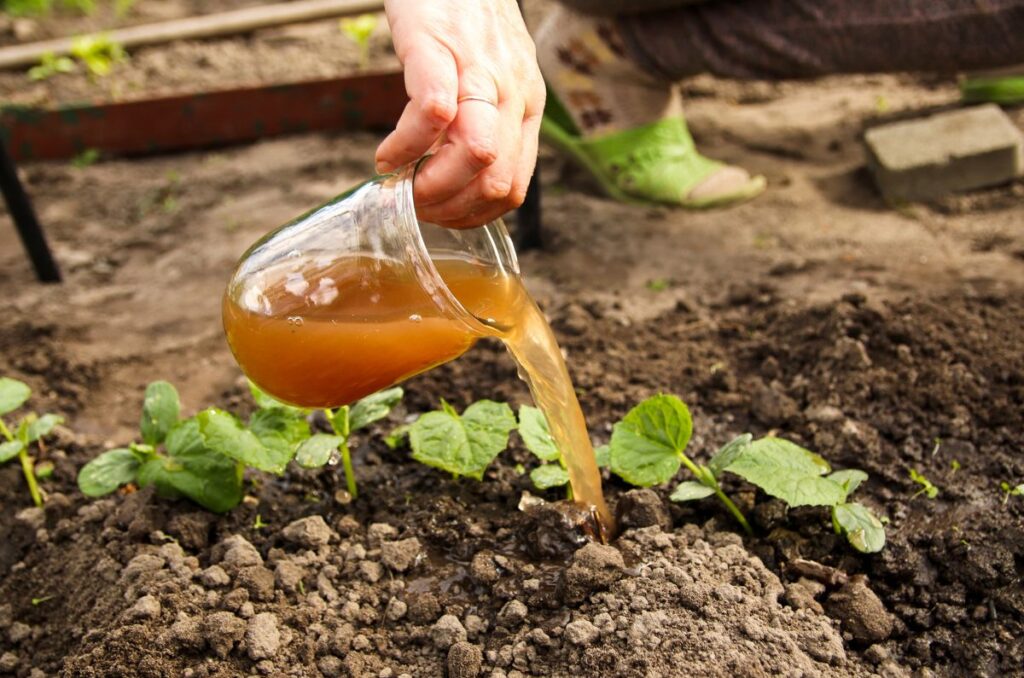
Are Organic or Synthetic Fertilizers Better for Peppers?
As an organic gardener with absolutely no bias, organic fertilizers are always better than synthetic.
But seriously, synthetic fertilizers are not the way to go for your vegetable garden. Sure they have their pros, but they are far outweighed by their cons.
Synthetic fertilizers do work quicker than organic and they are cheaper, but they also contaminate water, acidify the soil, burn your plants, and decrease soil biodiversity.
In contrast, organic fertilizers do the exact opposite and have none of these problems.
So always choose organic fertilizers for your pepper plants so you can have big and flavourful peppers.
Importance of Soil Microorganisms
Soil microorganisms are the backbone of a healthy vegetable garden. They are the ones breaking down organic matter into bioavailable nutrients for your plants.
If you didn’t have any microorganisms in your soil, it would be extremely difficult to grow vegetables.
They are so important that some organic fertilizers actually include beneficial microbes in them to help break it down.
When you fertilize your peppers with an organic fertilizer, the nutrients are not immediately available to the plants. They need to be broken down further to get into a usable form.
Generally, if you keep an organic garden, you will have large populations of soil microorganisms working to break down organic matter for your peppers to use.
You can also try using compost tea to increase the diversity of these microbes in your soil.
Should You Still Use Compost
Even though we are using these fertilizers for most of the peppers’ nutrition, you should still add compost to the soil.
Regardless of nutrient requirements, compost is still a good soil amendment for improving general soil health. Like I said, soil microorganisms feed on organic matter.
That means they will be more active in your soil if there is plenty of organic matter, like compost, manure, and mulch.
So you should still add compost to your soil at the beginning of the growing season.
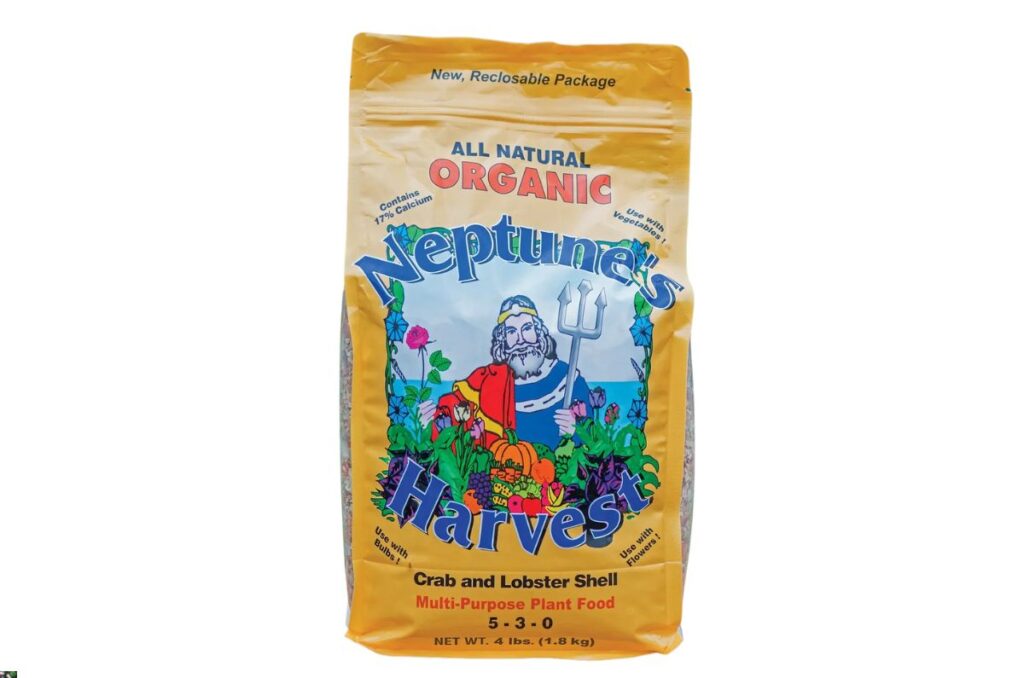
Types of Fertilizers for Pepper Plants
There are 2 main types of fertilizers for pepper plants, each with their own benefits for peppers. I tend to use both types during the growing season, but you can pick based on your needs.
Granular Fertilizers:
These fertilizers are easier to apply than others because you can just sprinkle it on your soil and water it in. There are usually instructions on the packet, but who follows that stuff anyway?
Granular fertilizers release their nutrients over a longer period of time because they actually still need to be broken down. They aren’t fully in their bioavailable form, meaning peppers can’t absorb the nutrients right away.
This is why you need living soil, so that the microorganisms can break down the fertilizer into a usable form for your pepper plants.
These fertilizers are best for gardeners who want a set-it-and-forget-it solution to fertilization. Just throw in some good fertilizer and your plants will be good for a few weeks.
That being said, apply granular fertilizers about every 2-3 weeks during the growing season.
Liquid Fertilizers:
As the name implies, these fertilizers are liquid and need to be diluted with water to apply to your peppers. I’ll also include water-soluble fertilizers in this group.
Although they still need to be broken down, liquid fertilizers generally provide nutrients much quicker than granular. And they can be used as a foliar feed, which means spraying the leaves with the diluted fertilizer.
I like to use liquid fertilizers every time I water my pepper plants. They can handle it and they will actually thank you later for it when they give tons of peppers.
When to Fertilize Pepper Plants
There are at least 3 main times that you should fertilize your pepper plants.
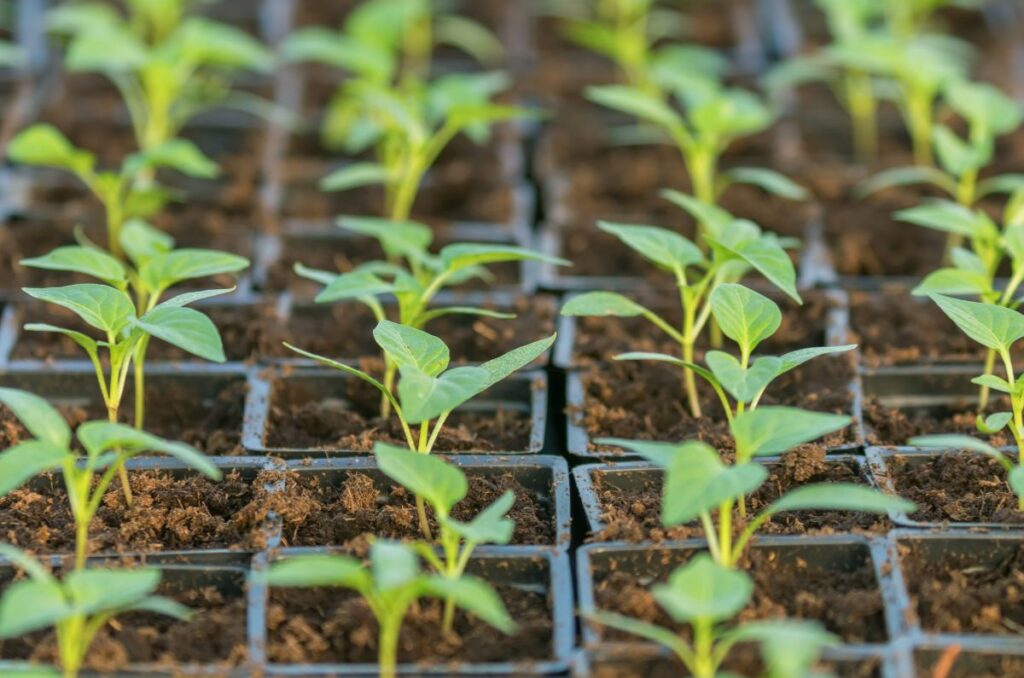
1. Seedling Stage
Your peppers should be started indoors before your frost date, which means they need to be fertilized as well.
Don’t fertilize them as soon as they sprout; wait until a couple of true leaves grow first.
Fertilize them at this time with a higher nitrogen and phosphorus fertilizer. Since nitrogen and phosphorus promote leaf and root growth, it’s perfect for young seedlings.
Neptune’s Harvest crab and lobster shell is perfect for this. This fertilizer has an NPK ratio of 5-3-0, which is the ideal ratio for young seedlings.
It’s also high in calcium, magnesium, and other micronutrients, which will help your pepper seedlings thrive.
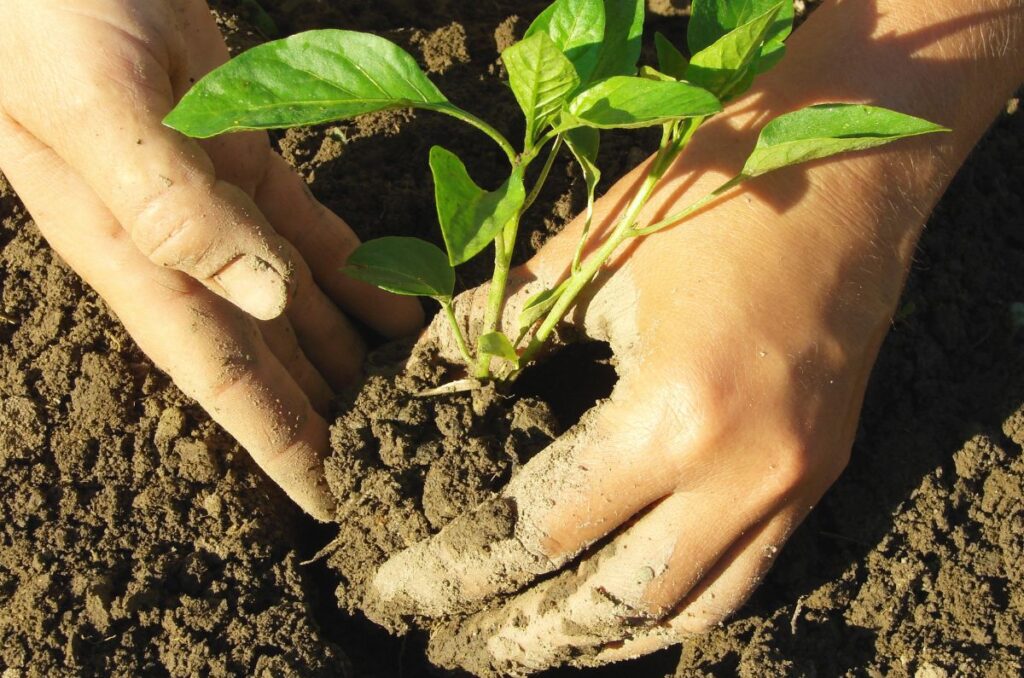
2. Transplanting Time
If you have kept up with the higher nitrogen fertilizer, then your plants should be nice and bushy with perfect green leaves.
But if we keep using nitrogen-rich fertilizer, then we will only have leaves and not too many peppers. So this is when we need to switch the fertilizer.
I like to use this Rose + Bloom fertilizer. It has an NPK ratio of 4-6-4, which is perfect for promoting more flower development, and eventually more peppers.
Use this granular fertilizer in the planting hole when you are transplanting your seedlings. Apply it every 3-4 weeks as the plants continue to grow.
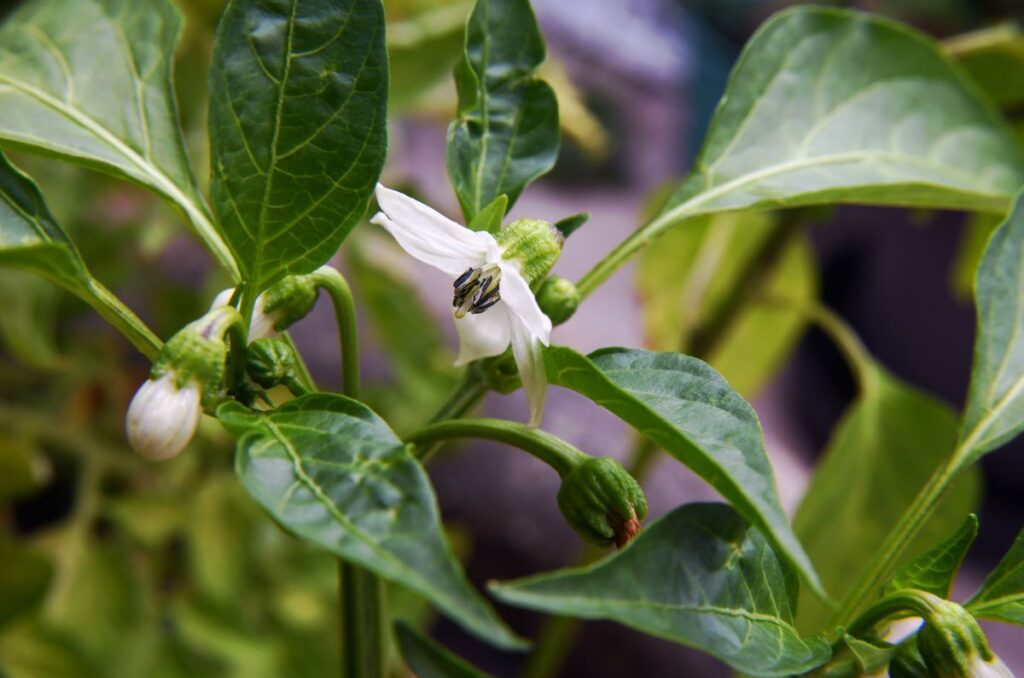
3. During Flowering and Fruiting
Once the plants start flowering, I like to switch to a liquid fertilizer that is higher in phosphorus and potassium.
This helps your pepper plants produce more flowers and better fruits.
Because less nitrogen is required, a fertilizer with an NPK ratio of 2-5-5, or something related, is perfect for this time. This will reduce the amount of leaf growth and shift it towards the flowers and fruit.
Liquid fertilizers can be applied every time you water your peppers. Simply dilute it in a water can and drench your peppers with that fertility.
Best Fertilizer for Peppers in Pots
When growing peppers in pots, you’re basically creating a new growing environment every season. You have to put new soil in every time, so it doesn’t really create a good microbiome to help your peppers.
While I do still recommend adding compost to your soil, you will probably have to fertilize a little bit more than usual.
And for that, I recommend using a liquid organic fertilizer. These are more readily available to your plants and require less decomposition from microorganisms.
And because a lot of the fertilizer will drain out of the pots, you may also have to fertilizer more often.
Frequently Asked Questions
Coffee grounds need to be broken down by soil microbes in order to provide nutrients for your peppers. Once they are broken down, they are mostly nitrogen.
Generally, tomato fertilizers can be used for peppers. They require the same nutrients, so they can be used for peppers. As long as the NPK ratio is the same, then you can use any fertilizer for peppers.
Neptune’s Harvest fish and seaweed fertilizer has an NPK ration 2-3-1, meaning that it is perfect for fertilizing peppers during the flower and fruit stage.
You can definitely foliar feed your peppers, but it can cause some problems if you do it too often. When you constantly wet the leaves of your peppers, it can increase the chances of them developing powdery mildew.
Even More Gardening Ideas
Here are a few more posts to get the ball rolling in your garden!
- How to Grow Lettuce from Seed in Every Season
- How to Grow Strawberries from Bare-Root Plants
- Easily Start a 5 Gallon Bucket Garden
If you liked this article, make sure to share it with your friends and family members who are also looking to sharpen their gardening skills. Also, consider signing up for our email newsletter; don’t worry, we won’t send you spam, just fresh gardening ideas every week!
If you want to learn more about vegetable gardening, check out The Real Gardener on Facebook, YouTube, and Pinterest.
Pin this post for later:
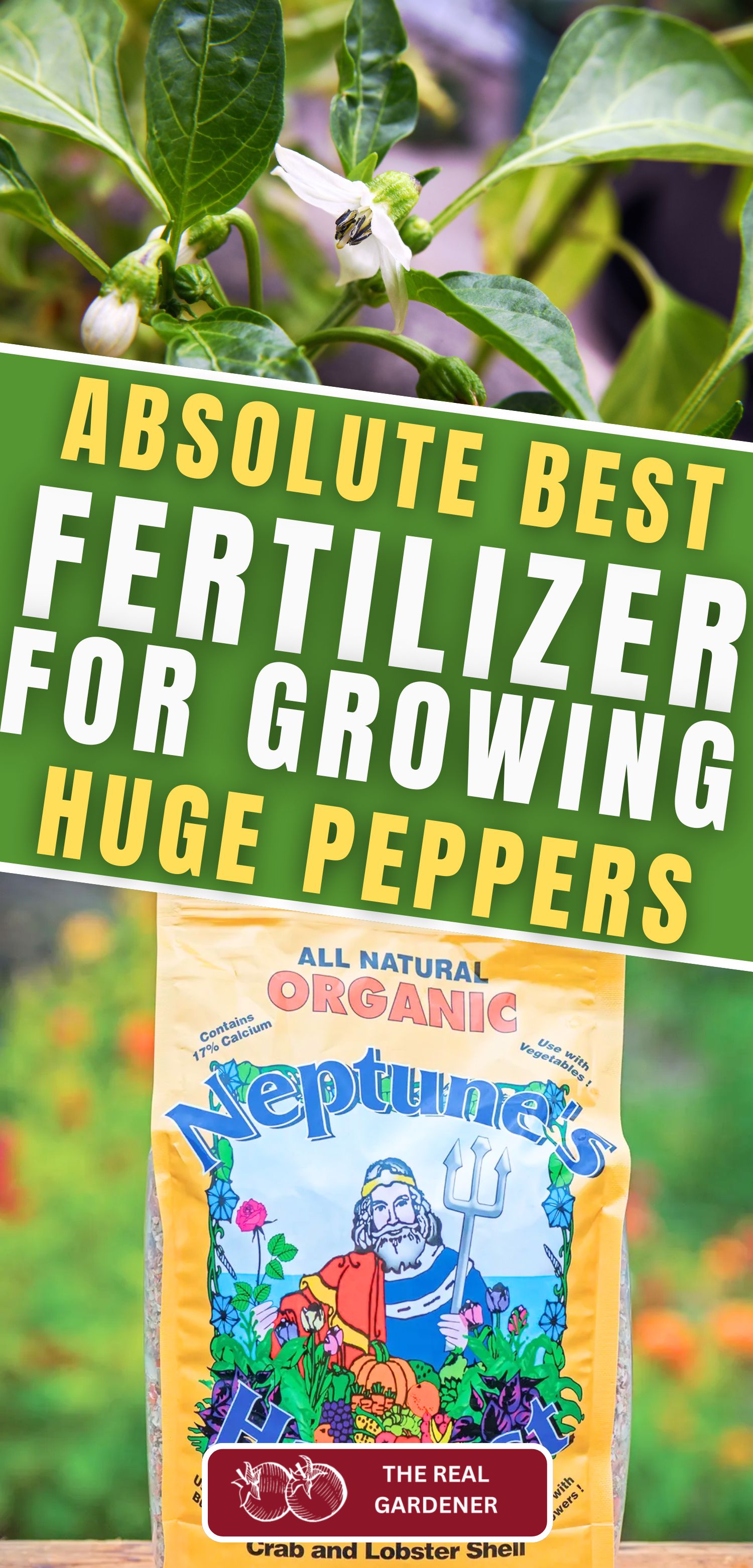

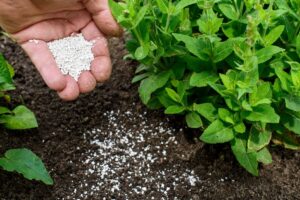
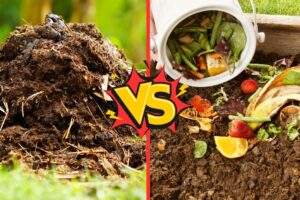
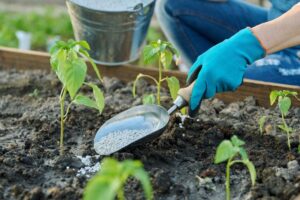
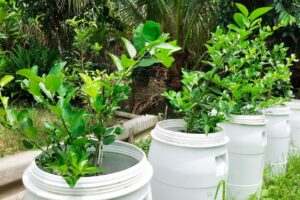


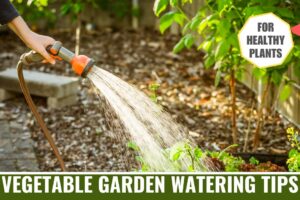
Leave a Reply